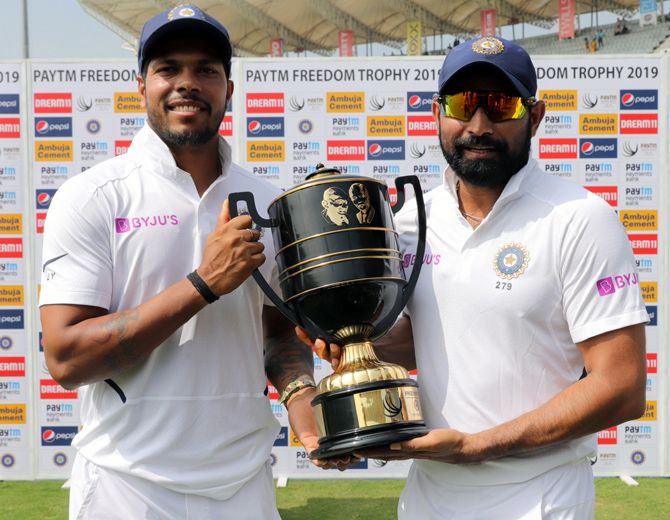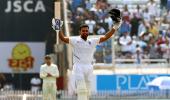'Every Test match we played we made bit more mistakes.'

South Africa had prepared for a spin onslaught in India but their batsmen were left flummoxed by the hosts' seam attack, captain Faf du Plessis said after his side's 3-0 defeat in a Test series that concluded on Tuesday.
India's fast bowlers, rarely expected to make a mark on docile surfaces at home, picked up 26 wickets in the three Tests with their spin-bowling colleagues accounting for 32.
That is a significantly higher haul than the eight wickets they claimed versus the spinners' 61 scalps when South Africa toured in 2015 for a four-Test series, which the hosts won 3-0.
"Obviously we spoke about this before the series, the mindset coming here, specially after 2015 was, prepare yourself for a lot of spinning tracks," du Plessis said at the presentation after India won by an innings and 202 runs in the last test held in the eastern city of Ranchi.
"And it's been the opposite, it's actually been really good cricket wickets. A lot in it for the bowlers, a lot in it for the batters, so fantastic Test cricket to be played.
"And the Indian seam attack was tremendous. Right through the series, relentless and they showed us how to consistently bowl line and length."
South Africa could not pose a fight against formidable India, losing all the matches by heavy margins.
"A tour like this reveals that there's a lot of mental scars that can happen and then obviously it's difficult to come out of that hole," Du Plessis said after they conceded their heaviest defeat to India in the third Test.
"It's just a relentless, ruthlessness the way they put big totals on the board every time. The effect it has on you mentally as a batting lineup, it takes a lot of energy and it takes a lot of toll and that's why you could see towards the end our batting was mentally weak. You don't want to be mentally weak."
Blaming Cricket South Africa, the visiting skipper further said the tour exposed the lack of planning as they did not think for future after greats like Hashim Amla and AB de Villiers retired.
"It shows that our structures are not where they need to be. The gap between domestic cricket and International cricket. If you look back three or four years and if someone had the vision of saying, in three or four years' time there will be a lot of inexperienced guys. A lot of 34, 35, 36 year olds could possible retire. So what do you do to make sure you get yourself ready for when that time comes?"
"And possibly we are guilty of not planning or when these guys going at the same time. And now you've got to replace not only one player but four or five of your best players. Perhaps we could've been a little bit smarter in our planning phase, and the phasing out of the great players," he said.
South Africa's batsmen, who grow up playing on hard and bouncy pitches and are considered more adept at playing fast bowling, looked at sea against the Indian pair of Mohammed Shami and Umesh Yadav.
Du Plessis lauded the duo for their consistency, something he said the fast bowlers in his side lacked during the series.
"I think it's the nature of the skill of the bowlers," the 35-year-old added.
"If you look at the guys who are successful, especially from their seam attack, it's the skiddy nature of how they bowl. But it's that area that they hit the whole time.
"They hit the top of the stumps relentlessly, and the ball generates pace, sometimes it squats down, a little bit low, but they hit the stumps all the time."
South Africa posted 431 in their first innings in the opening Test at Visakhapatnam against India, but crossed the 200-run mark only once in their remaining five innings.
"That's the frustrating part of the tour for us. Starting that first sitting there were some real good signs of things potentially to come, but it went the other way," du Plessis said. "Every Test match we played we made bit more mistakes."













 © 2025
© 2025